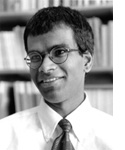|

Sharp tongue, maverick
mind
Dean's letter
Covering
black holes, fossil worms, and a cure for cancer
What's
in a word
Pathbreakers
Feeling most
alive

New
faculty
New
books
Honors
& awards
Bullets
& bytes
Hidden
gems

Soundings
is
a publication of the School
of Humanities and Social Science
at MIT
Comments and questions
to www-shss@mit.edu
|
Introducing new faculty
The faculty roster
of the School of Humanities and Social Science is expanding with an infusion
of new talent and expertise. Due to space constraints, we introduce in
this issue only half the new faces at our School. The remaining new faculty
will be featured in the Spring issue of soundings.
Brandice
Canes
Thomas Christensen
Sally Haslanger
Sendhil Mullainathan
Stephen Ross
Stephen Yablo
|

|
Brandice Canes,
a new assistant professor in the Political Science Department, specializes
in American politics and public policy. She obtained a BA in economics
from Princeton University in 1993 and completed a PhD in business,
with a specialization in political economics, from Stanford University
this year. Her dissertation, "Essays in Executive Branch Policy Influence,"
uses game-theoretic and econometric analysis to examine issues of
presidential legislative influence. Canes' research continues to focus
on this subject as well as the policy implications of administrative
institutions. Using data on wetlands permitting, she is currently
analyzing how litigation threats affect bureaucratic behavior. She
also is a recipient of fellowships from the Olin Foundation and the
Environmental Protection Agency's Science to Achieve Results program.
|
|

|
Thomas
Christensen
is a new tenured associate professor of political science, specializing
in Chinese foreign policy, international relations theory, and international
security affairs. He received a BA in history from Haverford College
in 1984, an MA in international relations from the University of
Pennsylvania in 1987, and a PhD in political science from Columbia
University in 1993. He has authored a book, Useful Adversaries:
Grand Strategy, Domestic Mobilization, and Sino-American Conflict,
1947-58 (1996), and articles on topics ranging from China's contemporary
security policy to security alliances in European history. He currently
is involved in two research projects, one addressing the triangular
relations of the United States, China, and Japan in the Cold War
and post-Cold War eras, the other focusing on the roles of ideology
and nationalism in China's policies toward its communist allies
in the 1950s and 1960s. Before coming to MIT, he taught at Cornell
University.
|
|

|
Sally Haslanger joins
MIT as a tenured associate professor in the Department of Linguistics
and Philosophy. She has published on topics in metaphysics, epistemology,
and feminist theory, with emphases on feminist epistemology, critiques
of objectivity, and theories of social construction. She received
her BA in philosophy and religion from Reed College in 1977, her MA
in philosophy from the University of Virginia in 1980, and her PhD
in philosophy from the University of California-Berkeley in 1985.
Her ongoing research interests include the distinction between natural
and social kinds; the problems of essentialism; and constructions
and reconstructions of race, gendered bodies, sexuality, and families,
especially motherhood. Before coming to MIT, she taught at the University
of Michigan, University of Pennsylvania, Princeton University, and
the University of California-Irvine. |
|

|
Sendhil
Mullainathan
is a new assistant professor in the Department of Economics. He
received a BA in computer science, economics, and mathematics from
Cornell University in 1993, and in 1998 earned a PhD in economics
from Harvard University. His
thesis developed a model of human memory used to understand biases
in decision making and economic puzzles in consumption and asset
pricing. His current research examines other interactions between
psychology and economics, European unemployment, firms' personnel
policies, corporate governance, gender discrimination, welfare to
work transition, and the impact of family structure on child outcomes.
|
|
 |
Stephen
Ross recently
joined the Sloan School of Management and the Department of Economics
as the Franco Modigliani Professor of Finance and Economics. Between
1985 and 1998 he served as the Sterling Professor of Economics and
Finance at Yale University. Ross received a BS in physics from the
California Institute of Technology in 1965 and a PhD in economics
from Harvard University in 1970. His research has focused on the economic
implications of arbitrage and uncertainty, and he is the co-author
of an introductory finance text, Corporate Finance. He currently
is working on models of corporate finance and on the concepts of rationality
and completeness in financial markets. In addition to his academic
work, he is a co-chairman of Roll & Ross Asset Management Corporation,
a director of CREF and of General Reinsurance Corporation, and a trustee
of the California Institute of Technology. |
|
 |
Stephen Yablo, a
new tenured associate professor in the Linguistics and Philosophy
Department, conducts research in metaphysics, the philosophy of mind,
and philosophical logic. Before coming to MIT, he taught for 12 years
at the University of Michigan. He has a BSc in mathematics and philosophy,
which he earned at the University of Toronto in 1979, and a PhD in
philosophy, which he gained at the University of California-Berkeley
in 1986. He enjoys thinking about identity, essence, causation, paradox,
color, existence, definition, truth - almost anything but ethics.
His current work concerns the corrosive effects of metaphor on the
traditional project of philosophical ontology. |
BACK TO TOP
|

Copyright © 2000 Massachusetts
Institute of Technology |

Fall 1998
|

![]()
![]()
![]()





